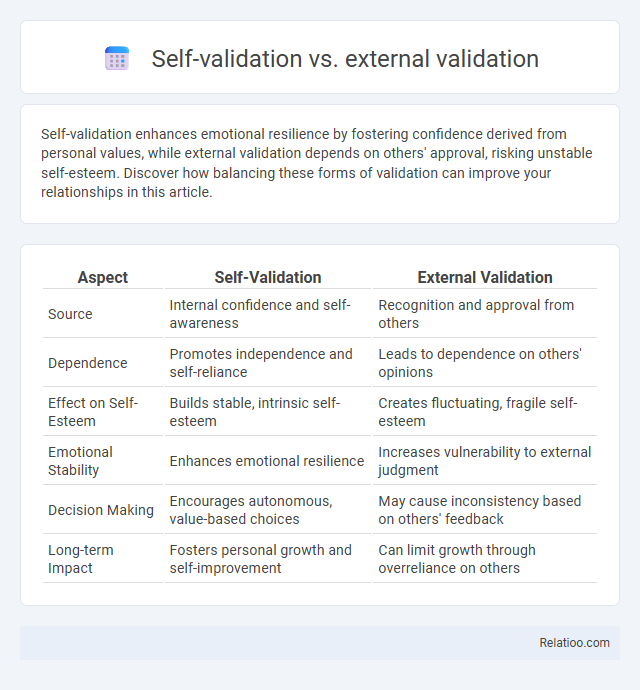Self-validation enhances emotional resilience by fostering confidence derived from personal values, while external validation depends on others' approval, risking unstable self-esteem. Discover how balancing these forms of validation can improve your relationships in this article.
Table of Comparison
| Aspect | Self-Validation | External Validation |
|---|---|---|
| Source | Internal confidence and self-awareness | Recognition and approval from others |
| Dependence | Promotes independence and self-reliance | Leads to dependence on others' opinions |
| Effect on Self-Esteem | Builds stable, intrinsic self-esteem | Creates fluctuating, fragile self-esteem |
| Emotional Stability | Enhances emotional resilience | Increases vulnerability to external judgment |
| Decision Making | Encourages autonomous, value-based choices | May cause inconsistency based on others' feedback |
| Long-term Impact | Fosters personal growth and self-improvement | Can limit growth through overreliance on others |
Introduction to Self-Validation and External Validation
Self-validation involves recognizing and accepting your own thoughts and feelings as legitimate, which strengthens emotional resilience and promotes genuine self-esteem. External validation, on the other hand, depends on others' approval and feedback to feel worthy, often leading to dependency on outside opinions for self-worth. Balancing self-validation with healthy external feedback can help you develop a stable sense of identity rooted in both internal affirmation and constructive social interactions.
Defining Self-Validation: What It Means
Self-validation means recognizing and accepting your own emotions, thoughts, and experiences as legitimate without needing approval from others. It is an essential skill for building emotional resilience and fostering authentic self-esteem. Unlike external validation, which depends on others' opinions, self-validation empowers your inner voice to guide your sense of worth.
Understanding External Validation: Seeking Approval
External validation involves seeking approval and recognition from others to feel valued or competent. Relying heavily on external validation can undermine Your self-confidence and lead to dependency on others' opinions. Cultivating internal self-validation helps establish a stable sense of self-worth independent of outside approval.
Psychological Roots of Validation Needs
Self-validation stems from an intrinsic recognition of emotions and experiences, fostering resilience and emotional stability by affirming your inner worth without reliance on others' opinions. External validation originates from social interactions and cultural conditioning, where approval from peers, family, or society influences self-esteem and behavior. Understanding the psychological roots of these validation needs highlights the balance between internal self-acceptance and the human drive for social connection, emphasizing that true emotional health depends on nurturing your self-validation while being mindful of external influences.
Benefits of Self-Validation for Mental Health
Self-validation enhances your mental health by fostering emotional resilience through acknowledging and accepting your feelings without relying on others' approval. Unlike external validation, which can create dependency and insecurity, self-validation builds inner confidence and reduces anxiety. Embracing self-validation promotes authentic self-awareness and strengthens psychological well-being by encouraging personal growth and emotional regulation.
Risks and Downsides of External Validation
Relying on external validation poses risks such as decreased self-esteem and increased vulnerability to criticism, leading to dependence on others' opinions for self-worth. This dependence can result in emotional instability and a lack of authentic self-identity, as individuals prioritize pleasing others over their true values. In contrast, self-validation fosters internal confidence and resilience by affirming personal experiences without external approval.
Identifying Your Validation Patterns
Identifying your validation patterns involves recognizing whether you primarily rely on self-validation, external validation, or a balance of both to affirm your worth. Self-validation empowers you to trust your own feelings and judgments, enhancing emotional resilience and autonomy, while external validation depends on feedback and approval from others, which can influence confidence and decision-making. Understanding these patterns helps you develop healthier self-esteem by aligning your validation sources with your personal values and experiences.
Strategies to Cultivate Self-Validation
Cultivating self-validation involves developing strategies such as mindful self-reflection, affirming personal values, and practicing self-compassion to build inner trust and emotional resilience. Techniques like journaling about personal achievements, setting realistic goals, and recognizing internal cues help reduce reliance on external validation from others. Consistent reinforcement of positive self-talk fosters a secure sense of self-worth, encouraging autonomy and emotional stability independent of external opinions.
Balancing Self-Validation with Healthy External Feedback
Balancing self-validation with healthy external feedback enhances emotional resilience and personal growth by integrating internal confidence and constructive input from others. Self-validation involves recognizing and accepting one's own thoughts and feelings without dependence on external approval, promoting authenticity and self-trust. External validation, when sought prudently, provides perspective and encouragement but must be balanced to avoid undermining intrinsic self-worth.
Conclusion: Embracing Authentic Self-Acceptance
Embracing authentic self-acceptance means prioritizing self-validation over reliance on external validation, cultivating inner confidence and emotional resilience. Your sense of worth becomes independent of others' opinions, fostering genuine contentment and mental well-being. This shift allows you to navigate challenges with a grounded, empowered mindset rooted in self-awareness.

Infographic: Self-validation vs External validation
 relatioo.com
relatioo.com